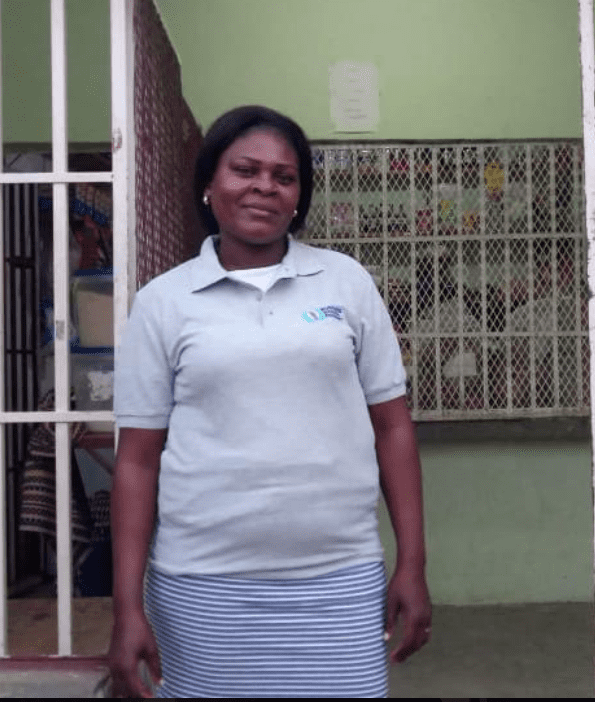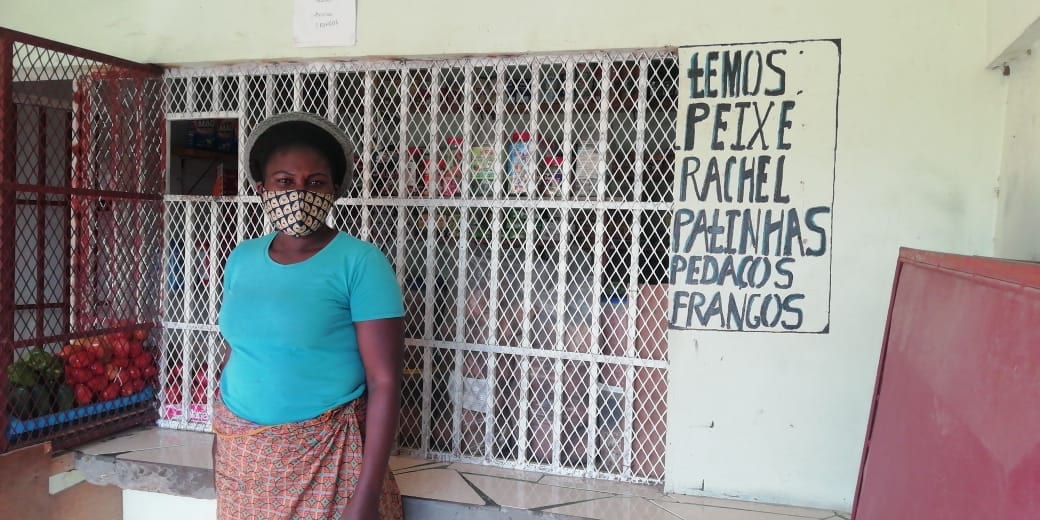Side by Side: Supporting Women-Owned Businesses in Mozambique
Like many other micro-retailers in Mozambique, Juliana Mário has seen her sales decrease because of the COVID-19 pandemic. However, with the support of TechnoServe’s Business Women Connect team, Juliana has learned how to keep her business open and maintain her livelihood through these difficult times.
In the suburban neighborhood of Khongolote, in Maputo, Mozambique, Juliana Mário tends her small grocery shop. The 35-year-old entrepreneur is proud of her store’s important role in the community, providing supplies like soap, food items, snacks, and phone credit.
But lately, Juliana has faced one of the most difficult periods of her business career: the steep economic hit brought on by the COVID-19 pandemic. She is one of the millions of micro-retailers in low-income countries struggling for business survival during this crisis — but unlike many others, she has received critical support to make it happen.
New Challenges
Before the pandemic, Juliana had a stable business with strong growth potential. In fact, she was already planning to expand her business by opening a hair salon in the same space to diversify and increase her income.
“Before COVID-19, sales were moving normally,” Juliana recounts. “I was able to sell around $90 per day.”
However, since mid-March, Juliana has been facing many challenges, including the loss of most of her customers.
“With the arrival of COVID-19, sales have reduced,” Juliana shares. “I started to sell $40 because the customers also decreased. Mainly, in the beginning, the customers no longer came here. They did not leave their homes to come buy. Prices also started to rise — mainly sugar and oil.”
Previously, Juliana would get a lot of business from students coming and going to the nearby school; however, with in-person classes canceled, these students are now mostly staying home. For the few customers she does have, she is having difficulty pulling together enough capital to purchase the most high-demand products. A combination of price inflation from her suppliers and the loss of customers has meant a reduction of over 50% in her daily sales.
Hear from Juliana and learn how TechnoServe’s support has helped her keep her business open during this time:
Re-Focusing on Survival
“When the COVID-19 crisis started, we were just beginning our training program with a new training group of 149 businesswomen,” recalls Abneusa Manuel, a business advisor for TechnoServe’s Business Women Connect program. “We had to quickly readapt [our program] so that we could support the women during this period of crisis.”
The Business Women Connect program (BWC) is a partnership between TechnoServe and the ExxonMobil Foundation. The program is centered around a five-month course for women entrepreneurs to learn better business skills and how to be more effective financial service providers.
The course facilitators, known as business counselors, meet in person every week with the entrepreneurs and teach them skills such as savings, recordkeeping, analyzing business performance, customer service, and merchandising. The goal is to support the entrepreneurs to expand their businesses and increase their incomes.

In early April, the BWC team conducted a rapid diagnostic survey of their entrepreneurs in order to understand their status and their changing needs in light of the pandemic. At the time, many of the women had closed their shops or indicated that they were considering closing, as they were anticipating lower sales and higher prices. The BWC team quickly realized that they would need to shift their strategy from coaching the entrepreneurs on how to expand and grow to how to break even and stay open.
“When we did the mobilization, we told the ladies that we were going to help them to make their business grow,” says Abneusa. “But now…we have to teach them how to make their business survive in this time of crisis.”
Part of the program’s adaptation to the pandemic included a shift to remote working, as the movement of people and the size of gatherings have been restricted by the government. The course could no longer meet in person; everything had to be virtual.
“We had to think quickly about new strategies to continue to support the women,” says Lucinda Francisco, a BWC business counselor. “We started working from home, which was very difficult because a good part of our work is in the field, training and coaching the women. I had to learn new technologies to be able to train [them]; we began sharing videos with them.”
These short videos, which followed a similar lesson plan that the program participants had been following in person, were filmed quickly by the business counselors using available technology, such as their own smartphones. The videos were then edited and reduced in size in order to be shared via WhatsApp.
Receiving messages with good tips through WhatsApp and knowing that I have a trainer available to support me in business helped me to keep my business open.”
— Juliana Mário
The structure and content of the videos were adapted to what was most relevant for these businesswomen to know during the crisis. The videos were complemented by images, graphs, audio, and Q&A opportunities throughout the bi-weekly WhatsApp lessons. Now that restrictions have eased, the BWC team can conduct one-on-one coaching sessions in person (following strict safety measures) to complement the phone sessions.
For the 30% of women who do not have access to WhatsApp, they are sent key information via SMS and can respond to TechnoServe business counselors via text. The business counselors also track participation rates for all channels.

Support in a Time of Crisis
Despite the challenges she continues to face, Juliana is grateful for the support she has received from her business counselor, Lucinda. She believes that it was through this support that she managed to keep her business open. Moreover, knowing that she is not alone and that there are many other women who receive the same support motivates her to not lose focus.
“Receiving messages with good tips through WhatsApp and knowing that I have a trainer available to support me in business helped me to keep my business open,” says Juliana. “I can maintain my sales and also keep my establishment open in this time of the COVID-19 crisis.”
Juliana intends to keep her business open by implementing the recommendations she learned in the training videos that Lucinda made.
“I diversified the products,” she explains. “I always keep in touch with customers to find out what their needs are, and I reduced the withdrawal of money in the business for my personal expenses. I’m also implementing preventive measures against COVID-19 in the business, such as providing water and soap for my clients’ handwashing before and after entering the store.”
She has even gained enough confidence during this crisis to return to thoughts of her previous dream.“I will continue to save for when the pandemic is over and continue with the construction I started [to] open a hair salon, as there is a lot of potential in my area,” she says.
Lucinda is very proud of Juliana and her other BWC entrepreneurs. “Juliana was thinking of closing her establishment, but so far she hasn’t,” she says. “That makes me feel good and makes me realize how important we have been — even in the face of this crisis, even in the face of so much suffering.”
At the time of the diagnostic, 29 of BWC’s entrepreneurs said they were thinking of closing their businesses, yet only two have closed to date. Moreover, of the 37 entrepreneurs that had already closed their shops due to the pandemic, 22 have actually re-opened within a month as a result of the training.
“One thing we guarantee is that the women always have our support,” Abneusa adds. “ They know that we are with them every day, side by side, during this situation.”




